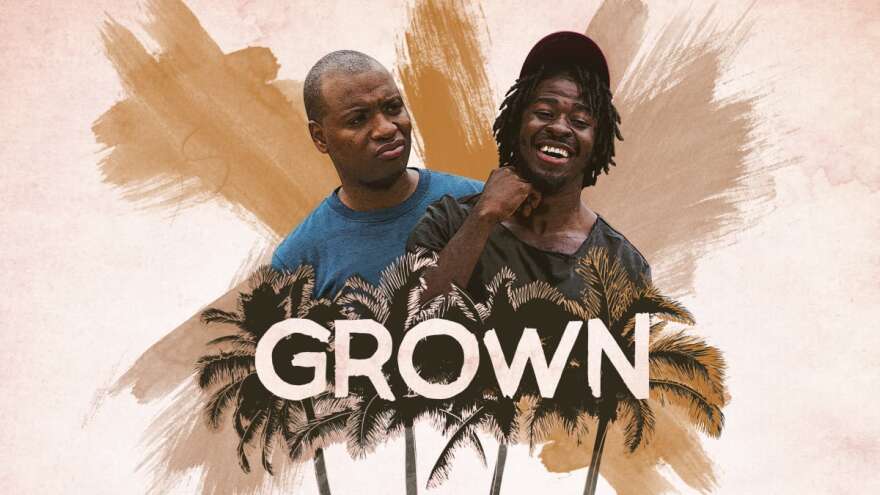Haitian Americans Joshua Jean Baptiste and Edson Jean grew up without any characters on screen that they felt accurately portrayed their Haitian background. So the South Florida natives decided to make a show of their own.
They are the stars and creators of the new web series GROWN, which is set in Miami. Both men are graduates of New World School of the Arts and were selected as the winners of Adaptive Studios’ Project Greenlight contest.
GROWN follows two coming of age Haitian-American men as they navigate through a transitional chapter in their lives. Baptise’s character suffers the death of his mother and moves in with his cousin (Jean’s character), where they are both forced to grow up and face the world. The show wrestles with themes surrounding death, relationships and finances.
Baptise says the idea was always to produce the show in Miami and bring light to home grown projects. Baptiste, Jean and the female lead of the web-series, Maria Corina Ramirez, joined Sundial Wednesday to discuss the significance of being authentic and specific when casting roles for any film, the premise of GROWN and the reaction they hope to generate in Miami.
The show is produced by Adaptive studios and premiered on the web platform Complex on May 22.
WLRN: [Why produce] the TV series here in Miami versus going to say New York or L.A. ?
Baptiste: The idea was always that we can do it here and believing that was the first step because so many people in Miami believe they have to go somewhere else to make something happen. So I think just switching the narrative of believing that it was possible was the first step. And then of course there's obstacles. I believe there are obstacles in everything, especially in production, but with obstacles there's always a loophole. So we were fine.
In the opening sequence of the pilot we see this very powerful relationship between Joshua and his mother. Can you talk about her role in the series?
Baptiste: Without revealing too much, I would say that ... the implications of her throughout the series are kind of an undercurrent of what he deals with. Basically him having to change environments and live with this promiscuous, problematic cousin of his. You know he's forced to deal with things that she has taught him. A lot of adults when they get to a certain age they kind of have to be like 'well was my mom right or wrong?' It's a fine line because some of the principles my mother ... taught me I still live by today.
So much of the show follows the experience of Haitian Americans. Why is it important for you to have genuine voices speaking in French Creole for the show?
Baptiste: The art of specificity, man. We come from the school [that] generality is the killer of all art. There's so many treasures in being specific and that's something that we all make sure to keep each other accountable for. Because why not? Edson and I, we've been looking at media for the past couple of years and we haven't seen accurately portrayed Haitians on screen. Not really. I watched some shows and I'm like that person is Jamaican, why are they - like what? From a broader perspective you know some dude in the Midwest is probably not going to know that that's not a Haitian but I think that's a part of the problem. Like you know why not be specific so you can reach out to that person in the Midwest and be like that's a Haitian person. I think the color palette is a lot brighter and more vibrant if you are specific.
Jean: I think for us the most important thing is representation. And art is so important because it's a reflection on life. And when you grow up in a society that doesn't authentically depict or represent who you are and where you're you're from you're left to almost feel like you don't exist in the world. And it trickles down. It trickles down into how society responds to your specific race or ethnicity or background because they almost seem not to value you a humans because they don't see you in their life and their art and you're not reflected. So for us representation is everything.
Much of the show dabbles in dark comedy. Is this style of humor reflective of the circumstances of your characters and what they're dealing with?
Jean: This style of comedy I think is just really inspired by our lives. We just really wanted to have a Haitian funeral element in there because we've been to several. And it's such a cultural experience. You're in there and there is real sad emotions that are going on but the antics want to make you laugh at times. You are just like this is insane. But people are like screaming from the deepest part of their soul and it's a real for them but it's like 'yo is there another way to handle this?'
You see all of these different scenes -- Biscayne Boulevard, walking through different neighborhoods. If you live in Miami you know these places, but is it for a Miami specific audience? Does it matter?
Ramirez: I feel like yes because the people that are in Miami are going to see the authenticity and they will be like 'yes that's my city.' The people who aren't from Miami, storywise will be able to relate to the characters because it's human condition storytelling. But it will also be nice for them because it's going to feel like they're a fly on the wall getting an inside look at something that they haven't seen in this way before.

